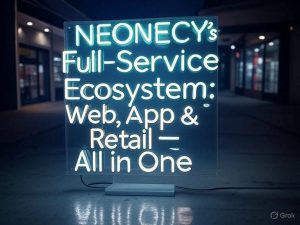In today’s fast-paced digital economy, businesses that fail to innovate risk being left behind. With the rise of decentralized technologies and the continued dominance of traditional web systems, the fusion of Web2 and Web3 — known as hybrid technology — offers a groundbreaking approach to sustainable growth. Hybrid Tech for Business is no longer just a buzzword; it’s a roadmap to resilience, adaptability, and future-readiness.
In this comprehensive guide, we’ll explore how combining Web2 and Web3 can transform operations, enhance customer experience, and make your business future-proof.
1. What Is Hybrid Tech for Business?
Hybrid Tech for Business refers to the integration of traditional Web2 systems (e.g., centralized apps, client-server models, cloud computing) with emerging Web3 technologies (e.g., blockchain, decentralized apps (dApps), and smart contracts).
This blend creates a robust infrastructure that benefits from the reliability of Web2 and the innovation of Web3, offering better security, transparency, automation, and user ownership.
2. Why Businesses Must Adapt
Change is constant, but the pace of technological change today is unprecedented. Businesses sticking strictly to Web2 risk:
-
Data centralization vulnerabilities
-
Limited transparency in transactions
-
Reduced user engagement due to lack of control
By incorporating Hybrid Tech for Business, organizations gain the advantage of security, efficiency, and innovation.
3. Key Benefits of Hybrid Tech for Business
a. Enhanced Security & Transparency
Web3’s blockchain backbone ensures data integrity and immutability. When you integrate this with Web2’s scalability, your business gets a secure and transparent system.
b. Decentralized Identity Management
Hybrid Tech for Business enables customers to control their own data through decentralized IDs while allowing businesses to comply with privacy regulations like GDPR.
c. Automation via Smart Contracts
Smart contracts enable trustless automation of transactions and agreements, improving reliability and reducing costs.
d. Token-Based Incentives
Businesses can use utility tokens for loyalty programs or engagement campaigns, creating a more dynamic customer relationship.
4. Real-World Use Cases
a. E-Commerce Platforms
Many e-commerce companies are already leveraging Hybrid Tech for Business by accepting crypto payments alongside traditional methods and offering NFTs as exclusive product perks.
b. Finance & Fintech
Hybrid platforms allow users to move funds via both banks (Web2) and DeFi protocols (Web3), offering unmatched flexibility.
c. Supply Chain Management
Combining Web2’s logistics software with blockchain-based traceability ensures transparency from source to shelf.
d. Content Creation & Media
Artists and content creators are using hybrid models to distribute their work traditionally while also minting NFTs to protect their rights.
5. Building Your Hybrid Tech Stack
To implement Hybrid Tech for Business, start with a solid tech stack that integrates the following:
-
Frontend: React.js, Vue (Web2)
-
Backend: Node.js, Python APIs
-
Blockchain Layer: Ethereum, Polygon, Solana
-
Storage: IPFS or Arweave for decentralized content
-
Database: Firebase (Web2) + The Graph (Web3)
These tools can work together to create a seamless experience that leverages both centralized and decentralized features.
6. Choosing the Right Development Team
Adopting Hybrid Tech for Business means working with teams that understand both Web2 and Web3. Look for developers or agencies with experience in:
-
Smart contract development
-
API integrations
-
Security audits
-
UI/UX for hybrid platforms
A skilled hybrid team ensures your tech foundation is both scalable and secure.
7. Legal & Regulatory Considerations
Web3 introduces new legal challenges. Businesses must navigate:
-
Token classifications (security vs. utility)
-
KYC/AML requirements
-
GDPR compliance for decentralized data
A hybrid model allows gradual adoption, letting companies stay compliant while innovating.
8. Marketing in a Hybrid World
Hybrid Tech for Business also impacts how you market your product. Traditional strategies like PPC, SEO, and email are still vital, but now you can add:
-
DAO-based governance participation
-
NFT airdrops for community building
-
Blockchain-verified reviews and testimonials
This dual approach allows you to reach both conventional and crypto-native audiences.
9. Case Studies of Successful Hybrid Businesses
a. Shopify + Crypto Integration
Shopify has integrated crypto payment options, allowing merchants to tap into decentralized finance while retaining its traditional storefront backend.
b. Reddit’s Vault NFTs
Reddit embraced Hybrid Tech for Business by offering NFT avatars tied to users’ profiles, combining Web2 social identity with Web3 ownership.
c. Starbucks Odyssey Program
Starbucks launched an NFT-based rewards program that builds on their existing loyalty system, enhancing engagement with Web3 elements.
10. Steps to Get Started
Here’s a simple roadmap to integrate Hybrid Tech for Business:
-
Evaluate Needs: Assess how Web3 elements can enhance your existing Web2 setup.
-
Start Small: Begin with simple use cases like crypto payments or NFT-based loyalty.
-
Build the Stack: Hire or contract a team to develop and test hybrid systems.
-
Educate Your Users: Create guides, videos, and onboarding support.
-
Stay Compliant: Work with legal advisors familiar with crypto regulations.
-
Measure Results: Use analytics to compare hybrid vs. traditional performance.
11. Common Challenges & How to Overcome Them
-
Tech Complexity: Simplify UX to make Web3 adoption user-friendly.
-
User Skepticism: Use education and case studies to build trust.
-
Security Risks: Perform regular audits and use battle-tested smart contracts.
-
Lack of Talent: Partner with hybrid development agencies or platforms.
Conclusion
The fusion of Web2 and Web3 is not just a trend — it’s the future. By implementing Hybrid Tech for Business, companies can remain agile, secure, and ready for whatever lies ahead in the tech landscape. From improved user experience to operational efficiency, the benefits of hybrid models are too great to ignore.
Start exploring how hybrid technology can work for your business today — because tomorrow is already here.





